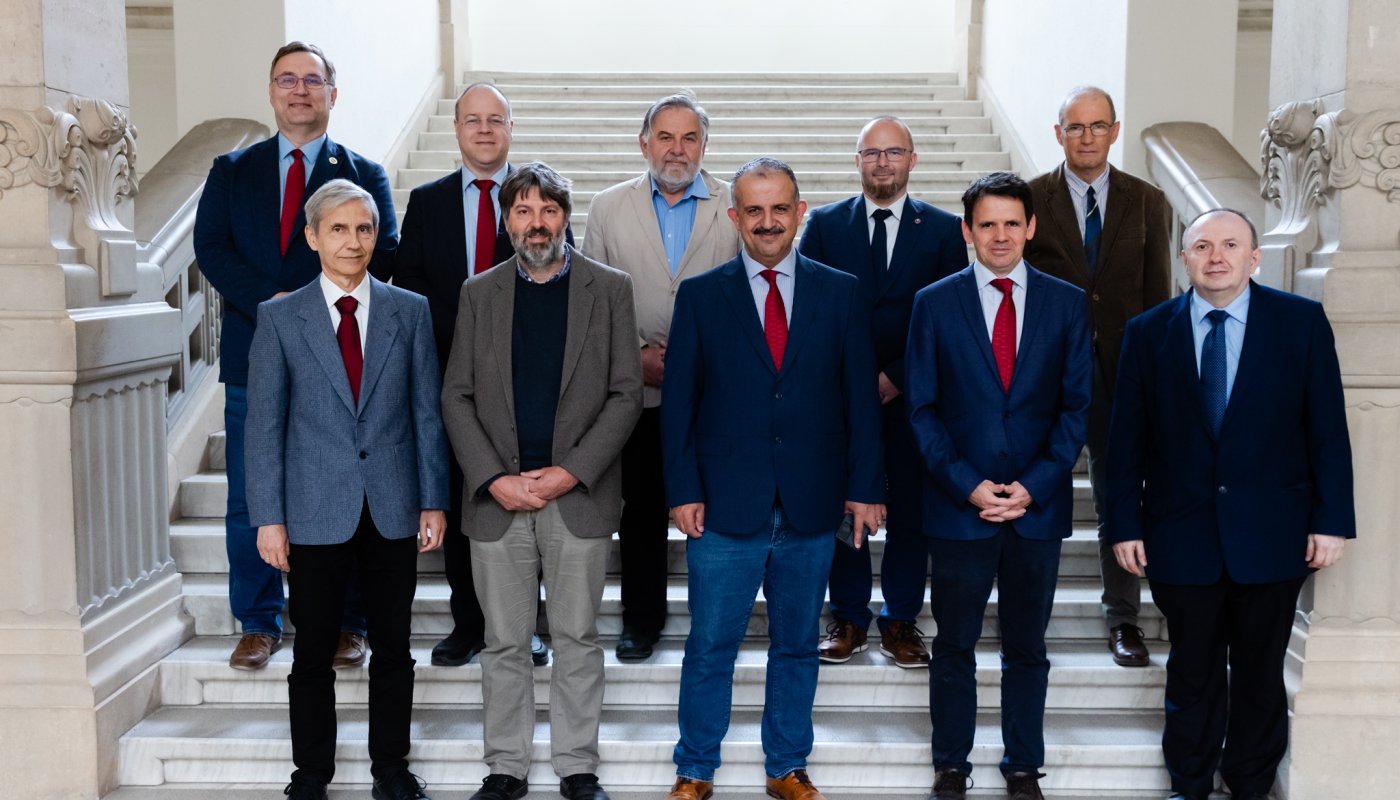News feed
Twelve BME researchers among this year's elected members of MTA
2025. 05. 12.
From chemists to mechanical engineers to mathematicians: new members of the Hungarian Academy of Sciences.
On 7 May, at the 199th General Assembly of the Hungarian Academy of Sciences, the triennial election of members took place. Of the BME candidates, 5 researchers were elected as full members, and 7 as corresponding members of MTA.
Full members:
Sándor Imre, university professor, dean of the Faculty of Electrical Engineering and Informatics. His scientific work covers new directions in 21st century telecommunications, including high-speed wireless and mobile networks, alongside communications and IT based on quantum mechanical principles. His scientific achievements and contribution to establishing a new school of thought were recognised with the Albert Szent-Györgyi Award. He is the Technical Director of the Quantum Information National Laboratory.
Tamás Insperger, university professor, head of the Department of Applied Mechanics, Faculty of Mechanical Engineering. His research area within engineering mechanics is dynamics. His academic and educational work was recognised with the Master Professor Gold Medal in 2021 and the Knight's Cross of the Hungarian Order of Merit in 2022. He has recently been appointed to the editorial board of a D1 journal. Head of the HUN-REN-BME Machine Dynamics Research Group.
György Zoltán Károlyi, university professor at the Institute of Nuclear Techniques, Faculty of Natural Sciences. He specialises in nonlinear dynamics and its applications. Developed a new method for the study of dynamic systems with time-varying parameters using the analogy of climate change, and further developed the theory of purely damped chaotic dynamic systems. Four of his students have obtained PhD degrees.
György Miklós Keserű, university professor at the Department of Organic Chemistry and Technology, Faculty of Chemical Technology and Biotechnology. He specialises in medicinal chemistry. He was awarded the Dennis Gabor Award in 2020 and the Széchenyi Prize in 2022. He was elected a member of Academia Europeae in 2023. Director of the Centre for Medicinal Innovation at the Hungarian Research Network’s Research Centre for Natural Sciences, head of the National Laboratory of Pharmaceutical Research and Development.
László Nyulászi, university professor at the Department of Inorganic and Analytical Chemistry, Faculty of Chemical Technology and Biotechnology. His narrow subject areas are medicinal chemistry, chemistry of the main group elements, computational chemistry, and the study of conjugated systems containing phosphorus and silicon. Over the past six years, 33 of his publications have appeared in mostly Q1 journals.
Corresponding members:
Lajos Molnár, university professor at the Department of Analysis and Operations Research, Faculty of Natural Sciences. He is a mathematician, his narrow subject areas are functional analysis and linear algebra. As editor-in-chief, he succeeded in renewing the journal Acta Scientiarum Mathematicarum (Szeged), founded by Frigyes Riesz and Alfréd Haar. Honours: Géza Grünwald Commemorative Medal (1992), Paul Erdős Award (2000), Academy Award (2011), Tibor Szele Commemorative Medal (2023).
Imre Norbert Orbulov, university professor, Dean of the Faculty of Mechanical Engineering. His narrow research area is metal matrix composites, in particular composite metal foams. He is a member of the Scientific Committee on Materials Science and Technology of the MTA Department of Engineering Sciences, as well as the Hungarian Academy of Engineering, the Hungarian Chamber of Engineers and the Hungarian Association of Material Testing. He has been given the opportunity to form an MTA Momentum research group twice, and he is also a two-time winner of the János Bolyai Research Fellowship. His scientific work was recognised in 2013 with the Junior Prima Award.
Ferenc Simon, university professor at the Department of Physics, Faculty of Natural Sciences. His narrow subject area is solid-state physics, including electron spectroscopy and quantum technology. He has built a number of new experimental facilities, including an optically detected magnetic resonance spectrometer and an impedance measuring microwave measuring system. He has successfully used the measurement techniques developed in medical and semiconductor research. Winner of the ERC Starting Grant and the MTA Momentum programme.
Károly Simon, university professor, head of the Department of Stochastics, Faculty of Natural Sciences. His narrow subject areas are dynamical systems, fractal geometry and geometric measure theory. He founded the School of Fractal Geometry at the BME Department of Stochastics, members of which regularly achieve internationally significant results. Honours: György Alexits Award (2001), Bolyai Memorial Plaque (2008), Academy Award (2016), Tibor Szele Commemorative Medal (2017) and the Officer’s Cross of the Hungarian Order of Merit (2023).
József Szilágyi, university professor at the Department of Hydraulic and Water Resources Engineering, Faculty of Civil Engineering. His narrow subject area is hydrology, hydrometeorology and water management. He has developed a novel thermodynamic description of the process of spatial evaporation, a widely applicable method that allows large-scale mapping of spatial evaporation and groundwater recharge using meteorological and satellite remote sensing data. In 2022 he was awarded the Pál Vásárhelyi Award and in 2024 the Academy Award.
Levente Tapasztó, research professor at the Faculty of Natural Sciences, BME. He develops new nanotechnology techniques for the targeted tuning of the properties of graphene and other two-dimensional materials. He has won prestigious national and international grants, such as Momentum (2014), ERC Starting Grant (2016), and Élvonal (2021). In his laboratory, BME physics students are doing their STM training. His most important awards are: Junior Prima Award, Academic Youth Award, MTA Physics Award and the Academy Award.
Miklós Telek, university professor at the Department of Networked Systems and Services, Faculty of Electrical Engineering and Informatics. His scientific work covers a wide range of stochastic modelling methods, starting from traffic modelling in telecommunication systems to high-speed wireless communication and Markov modulated processes. He has led several research (OTKA), development (EU FP7) and industrial cooperation (Magyar Telekom, Nokia, Ericsson) projects. His industrial collaborations have resulted in several telecom patents.
Rector's Office Department of Communications
